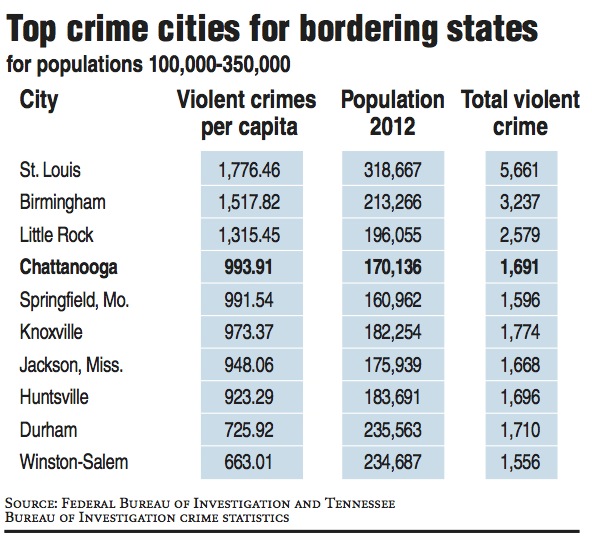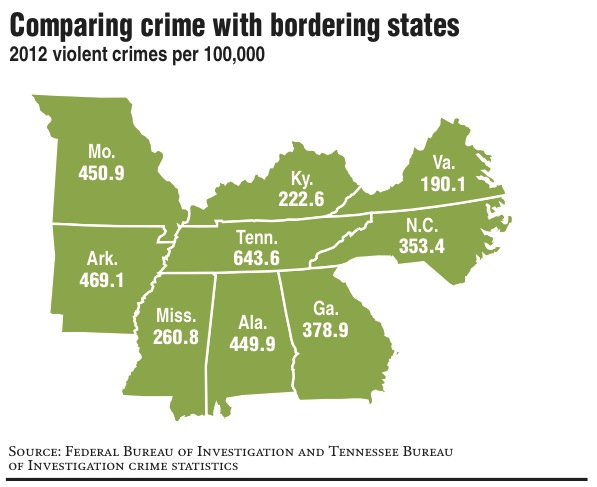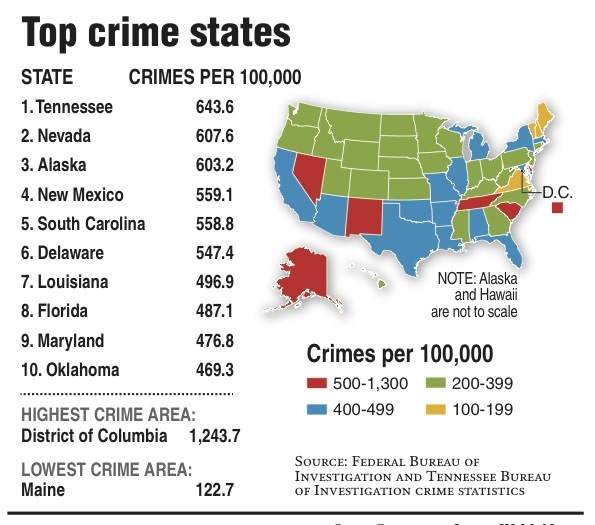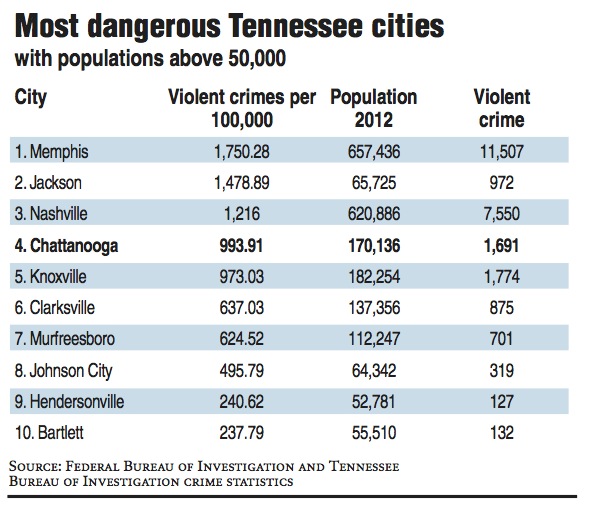VIOLENT CRIMEIn ChattanoogaShown in number of crimes per 100,000 residents, meaning they were victims of murder, rape, robbery or aggravated assault.2002 -- 1,513.52007 -- 1,295.82012 -- 993.9In Tennessee2002 -- 716.92007 -- 753.32012 -- 643.6SOURCE: FBICOUNTY RATE IS BELOW STATE, CITYThe violent crime rate in unincorporated Hamilton County is 237.2 per 100,000 people, well below Chattanooga's rate and the state average, according to U.S. Census and FBI data.
For a decade, Tennessee has been ranked among the nation's 10 most violent states.
Now it tops the list.
And even though the city is safer than it was a decade ago based on the rate of violent crime, experts and city officials say the numbers in Tennessee and Chattanooga should be a wake-up call to residents.
Recently released FBI data show Tennessee had the highest per capita violent crime rate in the nation in 2012. Statistically, 643.6 out of every 100,000 residents were victims of murder, rape, robbery or aggravated assault.
Five of the largest cities in Tennessee -- those with populations of 50,000 or more -- were over that state average, and Chattanooga was fourth on the list.
Chattanooga's 993.9 per capita violent crime rate puts it behind Memphis, Jackson and Nashville and ahead of Knoxville. But zero in on the state's four mid-sized cities -- those with populations of 100,000 to 350,000 -- and Chattanooga is the most dangerous in the state.
And that is despite improvements in public safety that have cut the violent crime rate here by a third since 2002.
Violent crime is also down in Tennessee.
But the rest of the nation has improved more.
Roger Thompson, chief adviser at the University of Tennessee at Chattanooga's criminal justice department, said the crime statistics in the city and state should be a call to action.
"I think it just gives us a reality check in just saying [violent crime] is here. So when we hear talk about Detroit, Chicago or Washington, D.C., we see it's in our backyards as well," Thompson said. "I think more than anything it gives us a reason as a community to think, and talk -- and challenges us to say we don't like where this puts us and we need to do something to address it."
The FBI warns not to use broad statistics to rank or predict crime rates, because it says demographics, degrees of urbanization, economics, education and other factors play into crime rates. Yet comparisons are inevitable.
The Scenic City was also fourth-highest among the 31 midsized cities in surrounding states -- Alabama, Arkansas, Georgia, Kentucky, Mississippi, Missouri, North Carolina and Virginia. The three ahead of Chattanooga in that category were St. Louis, Mo., Birmingham, Ala., and Little Rock, Ark.
Aggravated assaults, which are attacks that involve deadly weapons or cause extreme injury, make up the bulk of violent crime statistics. They should be viewed as seriously as homicide, Thompson said.
"To be honest, those are candidates for homicide, but we were able to get [victims] to the hospital and save them due to the miracles of modern medicine," Thompson said. "Multiply homicides by 10 and you get a better idea for what's actually going on out there."
In 2012, there were 1,154 aggravated assaults and 22 homicides in Chattanooga, according to Tennessee Bureau of Investigation reports.
To make the biggest reduction in violent crimes, Thompson said, governments and communities need to start by addressing domestic problems and educating children.
About half of aggravated assaults and homicides involve disputes between people who live in the same home, Thompson said. Further, he said, future criminal activity can be predicted by looking at third-grade reading levels in local schools.
"We can tell what our prison population is going to be in the future by grade three, based on reading scores. We can predict how many prison beds we will need from those numbers," he said.
Chattanooga Mayor Andy Berke said he's tackling crime head-on. He has touted public safety as his main priority since he started campaigning for the office.
A March study by Berke's staff found that Chattanooga had the 11th-highest violent crime rate in 50 midsized cities throughout the entire South, with the exception of Texas. Berke's staff used FBI crime stats and U.S. Census Bureau population figures.
He said people should not be concerned because Chattanooga ranks number four in the state for violent crime.
"What they should be concerned about is that we are even near the top," Berke said. "The lesson I hope people take away is our streets are too dangerous, just like many cities in Tennessee."
Berke said he has taken steps to curtail crime.
By next year, the city's police force will be increased by 40 officers, to a total of 486. A dedicated federal prosecutor for the city will start work Tuesday. He will seek to prosecute gang-, drug- and gun-related crimes in federal court, where sentences are steeper and there is no parole. Within three years, the city is slated to open a Family Justice Center with the aid of a federal grant. That effort is aimed at reducing violent crimes against women.
Berke said the High Point Initiative -- a strategy that seeks to stamp out large drug markets in the city -- is also in the planning stages for Chattanooga.
"You are already starting to see groundwork for High Point," Berke said. "Just out of High Point what I expect is to see a general downward trend of some significance."
Still, there is evidence of improvements. FBI statistics show that Tennessee's violent crime rate is down. In 2007, the violent crime rate in the state was 753.3 per 100,000 residents. In 2002, it was 716.9 per capita. Both are higher than the 2012 rate.
Chattanooga's violent crime rate has declined drastically over the past 10 years. In 2002, the violent crime rate was 1,513.5 per capita in the city. Five years after that, it was 1,295.8, statistics show.
Those reductions mirror a national trend in the reduction of violent crime -- and the city rate has benefited from a 20,000-person increase in the population.
Chattanooga crime statistics were not included in the FBI's 2012 report, because the city's numbers were not complete by a June deadline, according to TBI spokeswoman Kristin Helm. Local agencies funnel their numbers to TBI for analysis, then the state hands the verified numbers to the federal government.
Contact staff writer Louie Brogdon at lbrogdon@timesfreepress.com or at 423-757-6481.




